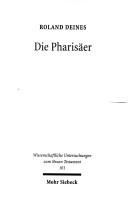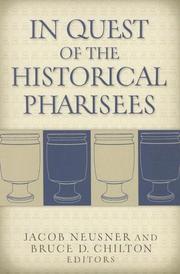| Listing 1 - 10 of 13 | << page >> |
Sort by
|
Book
ISBN: 9788878394810 8878394815 Year: 2022 Publisher: Rome Gregorian & Biblical Press
Abstract | Keywords | Export | Availability | Bookmark
 Loading...
Loading...Choose an application
- Reference Manager
- EndNote
- RefWorks (Direct export to RefWorks)
Chi sono i farisei? La ricerca degli ultimi decenni ha sottolineato i limiti delle fonti per lo studio storico di questo gruppo giudaico e la necessità di espandere la base documentale per definire meglio i filoni di indagine e scoprirne di nuovi. Questo lavoro rappresenta una delle prime esplorazioni sistematiche degli scritti dei Padri della Chiesa (in latino e greco) come base di studio non solo per la storia dei farisei, ma dello sviluppo della loro immagine nelle comunità cristiane dei primi secoli. In una prima sezione l'analisi statistico-lessicografica ha permesso di seguire l'uso del sostantivo fariseo ( pharisaeus) e dell'aggettivo farisaico (pharisaicus) nei vari autori, realizzando una mappa temporale, evidenziando lo sviluppo di una visione tipologica del fariseo, ed identificando gli autori o scritti più importanti di tale evoluzione. La successiva sezione affronta uno studio analitico degli scrittori cristiani identificati come più rilevanti e realizza un catalogo dei passi in cui sono presenti direttamente i farisei. In questo modo è stato possibile identificare le varianti del tipo farisaico in relazione alle comunità cristiane cui appartengono autori e scritti in cui i farisei sono citati. Questo catalogo, con una analisi specifica di ogni passo considerato, costituisce una base documentale a disposizione del lettore, non solo per sostanziare le conclusioni dello studio, ma come sostrato essenziale per future ricerche. La ricerca identifica non solo il progressivo affermarsi di una figura farisaica, quale immagine letteraria dell'ebreo pervicace ostile ai cristiani, ma una pluralità di sviluppi che hanno portato da un lato allo stereotipo moderno, dove fariseo è sinonimo di ipocrita, dall'altro ad una visione del fariseo diversa, complessa, ma non definitivamente negativa (pseudo-clementine). L'evoluzione tipo farisaico e le sue diverse sfaccettature sono riconosciute come espressione del cammino teologico delle prime comunità, incamminate verso la definizione della propria identità, di ciò che è cristiano, di ciò che è eretico e di ciò che è ebreo.
296*712 --- 296*712 Farizeeën --- Farizeeën
Book
ISBN: 9789042926493 Year: 2012 Publisher: Leuven Paris Walpole, MA Peeters
Abstract | Keywords | Export | Availability | Bookmark
 Loading...
Loading...Choose an application
- Reference Manager
- EndNote
- RefWorks (Direct export to RefWorks)
Q hypothesis (Synoptics criticism) --- Bible. N.T. Gospels --- Criticism, interpretation, etc --- 296*712 --- 296*712 Farizeeën --- Farizeeën

ISBN: 3161468082 9783161468087 Year: 1997 Volume: 101 Publisher: Tübingen: Mohr,
Abstract | Keywords | Export | Availability | Bookmark
 Loading...
Loading...Choose an application
- Reference Manager
- EndNote
- RefWorks (Direct export to RefWorks)
Bible --- Pharisees --- Religion historians. --- Jewish historians. --- Historiography. --- 296*712 --- Jewish historians --- -Religion historians --- Historians of religion --- Religious historians --- Historians --- Jewish sects --- Historians, Jewish --- Farizeeën --- Historiography --- 296*712 Farizeeën --- Religion historians --- Pharisees - Historiography.

ISBN: 9781932792720 1932792724 9786610839698 1280839694 1602580294 Year: 2007 Publisher: Waco: Baylor university press,
Abstract | Keywords | Export | Availability | Bookmark
 Loading...
Loading...Choose an application
- Reference Manager
- EndNote
- RefWorks (Direct export to RefWorks)
Jewish religion --- Bible NT --- anno 1-499 --- Pharisees. --- Judaism --- Rabbinical literature --- History. --- History and criticism. --- Pharisees --- -Rabbinical literature --- -296*712 --- Hebrew literature --- Jewish literature --- Jews --- Religions --- Semites --- Jewish sects --- History --- History and criticism --- Farizeeën --- Religion --- 296*712 Farizeeën --- 296*712 --- Judaism - History. --- Rabbinical literature - History and criticism.
Book
ISBN: 3533035573 Year: 1984 Volume: vol 2, Jahrgang 1984 Publisher: Heidelberg Winter
Abstract | Keywords | Export | Availability | Bookmark
 Loading...
Loading...Choose an application
- Reference Manager
- EndNote
- RefWorks (Direct export to RefWorks)
296*712 --- Aggada --- -Agada (Talmud) --- Agadah (Talmud) --- Aggadah (Talmud) --- Hagadah (Talmud) --- Haggada (Talmud) --- Haggadah (Talmud) --- Jewish legends --- Rabbinical literature --- Farizeeën --- History and criticism --- Simeon ben Shetah --- -Legends --- -History and criticism --- -Farizeeën --- 296*712 Farizeeën --- -296*712 Farizeeën --- Agada (Talmud) --- Simeon ben Shetaḥ, --- Schimeon ben Schetach, --- Shimʻon ben Sheṭaḥ, --- Legends --- History and criticism. --- Legendes juives

ISBN: 220404007X 9782204040075 Year: 1990 Volume: 86 Publisher: Paris: Cerf,
Abstract | Keywords | Export | Availability | Bookmark
 Loading...
Loading...Choose an application
- Reference Manager
- EndNote
- RefWorks (Direct export to RefWorks)
Pharisees. --- Jews --- History --- 296*712 --- Pharisees --- -#GOSA:I.NT.Alg.M --- #GGSB: Theologie (N.T.) --- Hebrews --- Israelites --- Jewish people --- Jewry --- Judaic people --- Judaists --- Ethnology --- Religious adherents --- Semites --- Judaism --- Jewish sects --- Farizeeën --- -Jews --- -296*712 --- 296*712 Farizeeën --- #GOSA:I.NT.Alg.M --- Theologie (N.T.) --- Jews - History - 586 B.C.-70 A.D.
Book
ISBN: 3460044411 9783460044418 Year: 1991 Volume: 144 Publisher: Stuttgart: Katholisches Bibelwerk,
Abstract | Keywords | Export | Availability | Bookmark
 Loading...
Loading...Choose an application
- Reference Manager
- EndNote
- RefWorks (Direct export to RefWorks)
Pharisees. --- Sadducees. --- Essenes. --- Judaism --- History --- 296*712 --- 296*713 --- 296*714 --- Pharisees --- Sadducees --- Essenes --- -#GGSB: Exegese N.T. --- #GGSB: Johannes --- #GGSB: Synoptici --- #GROL:SEMI-22<08> Stut 144 --- Jews --- Religions --- Semites --- Jewish sects --- Qumran community --- Farizeeën --- Sadduceeën --- Essenen --- -Religion --- Religion --- -296*712 --- 296*714 Essenen --- 296*713 Sadduceeën --- 296*712 Farizeeën --- #GGSB: Exegese N.T --- Hellenistic Judaism --- Judaism, Hellenistic --- Exegese N.T --- Johannes --- Synoptici --- Judaism - History - Post-exilic period, 586 B.C.-210 A.D.
Book
ISBN: 9782872992362 2872992367 Year: 2013 Volume: 42 Publisher: Bruxelles: Lessius,
Abstract | Keywords | Export | Availability | Bookmark
 Loading...
Loading...Choose an application
- Reference Manager
- EndNote
- RefWorks (Direct export to RefWorks)
Une approche de la notion de révélation dans le monde juif au 1er siècle, à l'époque du Nouveau Testament. L'étude permet de saisir le contexte dans lequel s'enracine le christianisme naissant.
Farizeeers --- Phariseens --- Pharisees --- Christianisme -- Relations -- Judaïsme --- Revelation (Jewish theology) --- Christianity and other religions --- Pharisiens --- Révélation --- Christianisme --- Relations --- Judaïsme --- Judaism --- 296*712 --- 231.741 --- C1 --- christendom --- Bijbel --- Farizeeën --- Openbaringsbeeld--(in het algemeen) --- Kerken en religie --- 296*712 Farizeeën --- 231.741 Openbaringsbeeld--(in het algemeen) --- Christianisme -- Relations -- Judaïsme --- Revelation --- Révélation --- Judaïsme --- Judaism. --- Christianity --- Origin --- History
Book
ISBN: 9782226458278 2226458271 Year: 2021 Publisher: Paris : Albin Michel,
Abstract | Keywords | Export | Availability | Bookmark
 Loading...
Loading...Choose an application
- Reference Manager
- EndNote
- RefWorks (Direct export to RefWorks)
« Malheur à vous, scribes et pharisiens hypocrites ! » La phrase terrible que l'évangile de Matthieu met dans la bouche de Jésus a pour deux millénaires déterminé l'image des pharisiens comme faux dévots, alimentant ainsi la polémique anti-judaïque. Depuis seulement quelques décennies, l'exégèse chrétienne et le recours aux sources historiques anciennes, de Flavius Josèphe à la littérature rabbinique, ont permis de rendre justice à ce courant du judaïsme antique. La grande historienne de la période, Mireille Hadas-Lebel, fait le point sur ce que l'on sait et sur ce qui reste encore dans l'ombre.Par quelles croyances et pratiques les pharisiens se distinguaient-ils des autres courants juifs ? Quelle était leur influence auprès des masses ? Les vifs débats que Jésus mène avec eux relèvent-ils d'une critique externe ou au contraire d'une controverse interne au mouvement pharisien - autrement dit, pourrait-on aller jusqu'à dire que Jésus lui-même était un pharisien ? --
Pharisees --- Christianity and other religions --- Judaism --- Jewish sects --- Relations&delete& --- Christianity --- Bible. --- Evangelie (Book of the New Testament) --- Fukuinsho (Books of the New Testament) --- Gospels (Books of the New Testament) --- Gospels, Synoptic (Books of the New Testament) --- Synoptic Gospels (Books of the New Testament) --- Criticism, interpretation, etc. --- Jews --- Religions --- Semites --- Religion --- 296*712 --- 296*712 Farizeeën --- Farizeeën --- Pharisiens --- Relations --- Brotherhood Week

ISSN: 09208607 ISBN: 9004099239 9004246975 9789004099234 Year: 1993 Volume: 44 Publisher: Leiden: Brill,
Abstract | Keywords | Export | Availability | Bookmark
 Loading...
Loading...Choose an application
- Reference Manager
- EndNote
- RefWorks (Direct export to RefWorks)
Da Costa's long-lost book rejects the divine origin of the rabbinic tradition. His insight was that what he calls Pharisaism is irreconcilable with the religion of the Pentateuch and therefore cannot derive from the same source. He claims, for example, that the Law of Moses does not allow for a belief in an afterlife for individual human beings. Concomitantly he denied the Mosaic origin of the notion of eternal punishment. The rabbinic reading of the Mosaic Law appeared to him almost as great a falsification as the Christian one. Yet there could be no reversion to Christianity and despite his deep rift with the synagogue he still believed in ultimate redemption for the Jewish people. As he so dramatically declares in his closing sonnet, Israel's rehabilitation depends on its shedding man-made doctrines, and holding fast to the Law in its purity.
Judaism --- Immortality --- Early works to 1800 --- 296*712 --- 237.2 --- -Judaism --- -Immortality --- -Jews --- Religions --- Semites --- Jews --- Life after death --- Eschatology --- Future life --- Immortalism --- Farizeeën --- Onsterfelijkheid van de ziel --- Apologetic works --- -Early works to 1800 --- Religion --- -Farizeeën --- 237.2 Onsterfelijkheid van de ziel --- 296*712 Farizeeën --- -237.2 Onsterfelijkheid van de ziel --- Judaism - Early works to 1800 --- Immortality - Judaism - Early works to 1800 --- Judaism - Apologetic works - Early works to 1800
| Listing 1 - 10 of 13 | << page >> |
Sort by
|

 Search
Search Feedback
Feedback About UniCat
About UniCat  Help
Help News
News